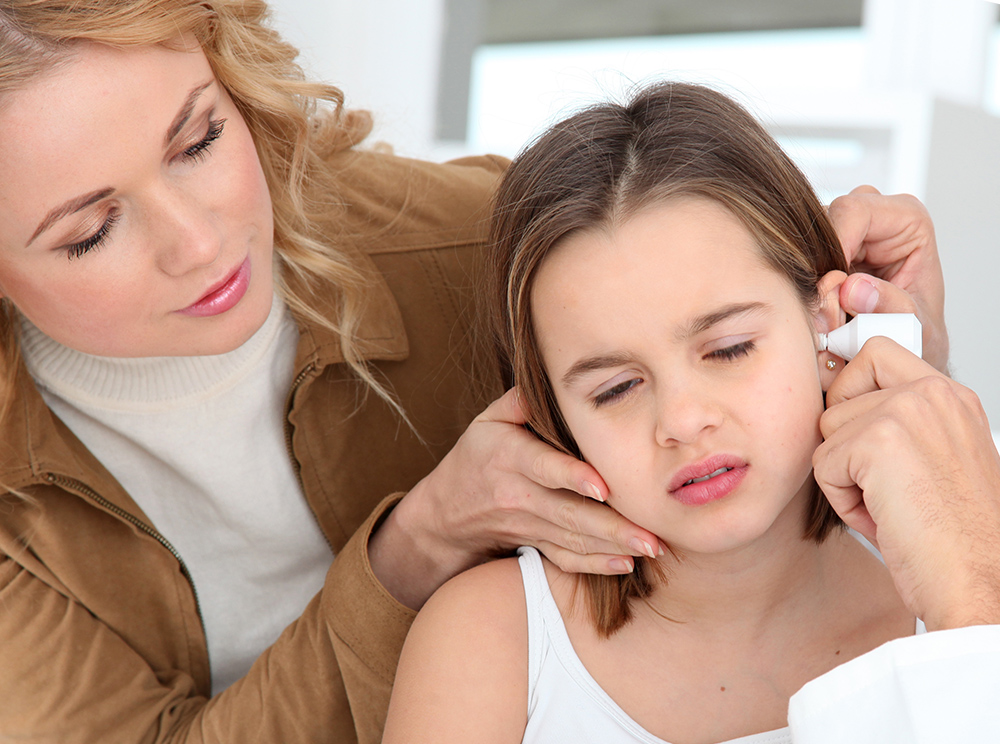Table of Contents
Did you know that ear infections are the number one reason parents take their children to the doctor? They’re often the first illness a baby or toddler gets. They can be painful, and it’s so hard for parents to see their little ones suffer. But ear infections don’t always require antibiotics. While we have a natural tendency to want to leave the pediatrician’s office with an immediate solution, we’re becoming more aware of the dangers of the overprescription of antibiotics. Sometimes it’s best to watch and wait–the infection will often go away on its own.
What Is an Ear Infection?
An ear infection is an inflammation of the middle ear (the bones and tubes between the outer ear and the vital nerves of the inner ear) that occurs when fluid builds up behind the eardrum. Infections can be caused by viruses or bacteria, which often impact how we treat them. According to the National Institutes of Health, five out of six children will have at least one ear infection by their third birthday.
Why Do Kids Get So Many Ear Infections?
The NIH points to several reasons why kids are more likely to get ear infections:
- Children’s eustachian tubes (the tubes that connect the middle ear to the nasal cavity) are smaller and more level than those of adults. This means it’s harder for fluid to drain from the ear, so if a child’s tubes get blocked by mucus from another respiratory infection, fluid may not drain properly.
- Children’s immune systems are still developing, so it can be harder for them to fight infections.
- In children, if bacteria gets trapped in the adenoids (infection-fighting tissue at the back of the nasal cavity), it can cause a chronic infection that gets passed to the eustachian tubes and middle ear.
What Are the Symptoms of an Ear Infection?
Pain is one of the biggest red flags for an ear infection and one of the reasons they’re so hard for parents to wait out. According to the Centers for Disease Control, the main symptoms of an ear infection include:
- Ear pain
- Fever
- Fussiness/irritability
- Rubbing or tugging at the ear
- Difficulty sleeping
Should My Child See Her Pediatrician for an Ear Infection?
In some cases with older babies and toddlers, mild symptoms may go away on their own. But if your child is under 6 months old, has a high fever, severe pain, drainage or swelling in the ear, it’s time to call your pediatrician. However, your doctor won’t necessarily prescribe antibiotics right away. Ear infections are caused by both bacteria and viruses, so antibiotics aren’t always the solution. According to the American Academy of Family Physicians, there are several reasons why doctors don’t prescribe antibiotics for every ear infection:
- Antibiotics don’t work for ear infections caused by viruses.
- Antibiotics don’t help the pain associated with ear infections
- Infections from both viruses and bacteria often disappear without antibiotics in a few days, especially in children over two years old.
- Physicians are keenly aware that the overprescription of antibiotics makes vital medicines less effective, so we work hard to use them only when truly necessary. In many cases, your doctor will watch the infection for a few days to see if it goes away on its own.
When Is Treatment with Antibiotics Necessary for an Ear Infection?
If your child is in a lot of pain and the symptoms last more than a few days, your pediatrician will likely recommend a round of antibiotics. According to the AAFP, here are some of the circumstances where antibiotics are likely to be prescribed for an ear infection:
- Infants six months or younger.
- Babies ages six months to two years have moderate to severe ear pain.
- Children 2 years or older who have a fever of 102.2 or higher.
- Children with other conditions that could make the infection harder to heal, including cleft palate, Down syndrome, immune disorders and cochlear implants.
What Are the Treatments for Ear Infections?
If your pediatrician recommends antibiotics, she’ll usually start with amoxicillin, an effective and safe antibiotic for bacterial infections that is one of the most commonly prescribed for young children. Whether or not your doctor opts for antibiotics or a watch-and-wait approach, rest and fluids are key, as with any childhood respiratory infection or virus.
For pain relief at home, your pediatrician will usually recommend Acetaminophen (Tylenol) for babies under six months and Acetaminophen or Ibuprofen (Motrin) for children six months and older. Remember that according to the CDC, over-the-counter cough medicines should not be given to children under four and should only be given to older children with your doctor’s approval. Recent research has shown that the negatives of these OTC medicines often outweigh any benefits.
How Long Does It Take for an Ear Infection to Clear Up?
Many mild ear infections will clear up in two or three days. If antibiotics are prescribed, the course is usually ten days. However, fluid in the ear may linger for a few weeks even after the infection clears up.
How Can I Prevent Ear Infections?
The CDC offers several tips for reducing the risk factors that contribute to ear infections. These include:
- Staying up to date on childhood vaccines, including the pneumococcal vaccine that helps protect against the Streptococcus pneumoniae bacteria that can cause ear infections and the flu vaccine.
- Frequent handwashing by parents and caregivers
- Breastfeeding until at least six months passes on mom’s immunity to babies
- Avoid exposing your child to secondhand smoke
Baby’s first sick visit: it’s never fun, sometimes scary and often related to an ear infection. But don’t worry if your pediatrician sends you home empty-handed at first. At Loudoun Pediatric Associates, we’ll make sure your child gets what she needs in the case of an ear infection, whether it’s a round of antibiotics or a few days of rest and watchful waiting. Sometimes we need an antibiotic to give those germs the boot, but in other cases, rest, fluids and lots of snuggles are the best prescriptions.








